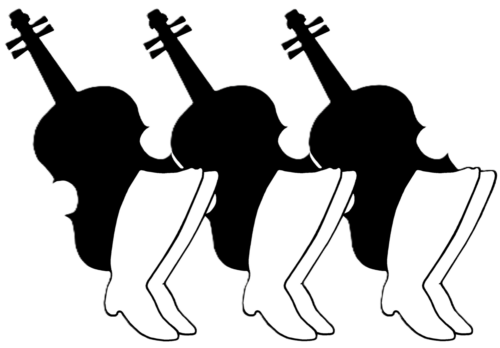Two levels of dance instruction will be offered. The 2025 dance and music material will be from the Nádasmente area of Kalotaszeg. This area is known as Cifra Kalotaszeg or “Elegant Kalotaszeg”. Dance teaching will focus on the villages of Méra, Magyarvista, and Andrásháza.
- Méra: The gem of Cifra Kalotaszeg, known for its folk art, folk costumes, dances and music, is one of the most famous settlements of Kalotaszeg in Central Transylvania, located 12 km from Cluj. The csárdás and szapora from Méra have a rich set of motifs that beginner and advanced dancers will learn and dance.
- Magyarvista: Magyarvista is a village at a road’s end, 14 km from Cluj. It’s one of the oldest settlements in Kalotaszeg. The settlement is famous for its 13th-century church, its stone carvings, and the most ornate costumes as well as for its outstanding dancing personality, the most famous dancer of the Kalotaszeg lads’ dance (legényes), István Mátyás ‘Mundruc’. Men can learn Magyarvista’s figures of the lads’ dance – which is considered the most virtuoso men’s dance in Europe.
- Andrásháza: The settlement of Andrásháza (Radaia) is located in the Nádasmente region, 11 km from Cluj, on the edge of Kalotaszeg in Cluj county. It belonged to Méra until the 20th century. It is a predominantly Romanian settlement. At camp, dancers in the advanced group will learn the învârtită and szapora from Andrásháza.
In addition to the dances from Kalotaszeg, a woman’s karikázó (circle dance) from Sárközi will be taught.
For more information about the Kalotaszeg region click here.
Session 1 (morning)
- Int/adv: Kalotaszeg taught by Gábor Kovács and Nóra Kovács-Gál
- Beginner: Kalotaszeg taught by Mátyás Tima and Boglárka Brenner
Session 2 (afternoon)
- Int/adv: Kalotaszeg taught by Gábor Kovács and Nóra Kovács-Gál
- Beginner: Kalotaszeg taught by Mátyás Tima and Boglárka Brenner
Session 3 (afternoon)
- Men’s dances from Kalotaszeg taught by Gábor Kovács
- Women’s karikázó (circle dance) from Sárközi by Nóra Kovács-Gál
- Children’s dance taught by Mátyás Tima and Boglárka Brenner
Dance Instructors – Gábor Kovács and Nóra Kovács-Gál
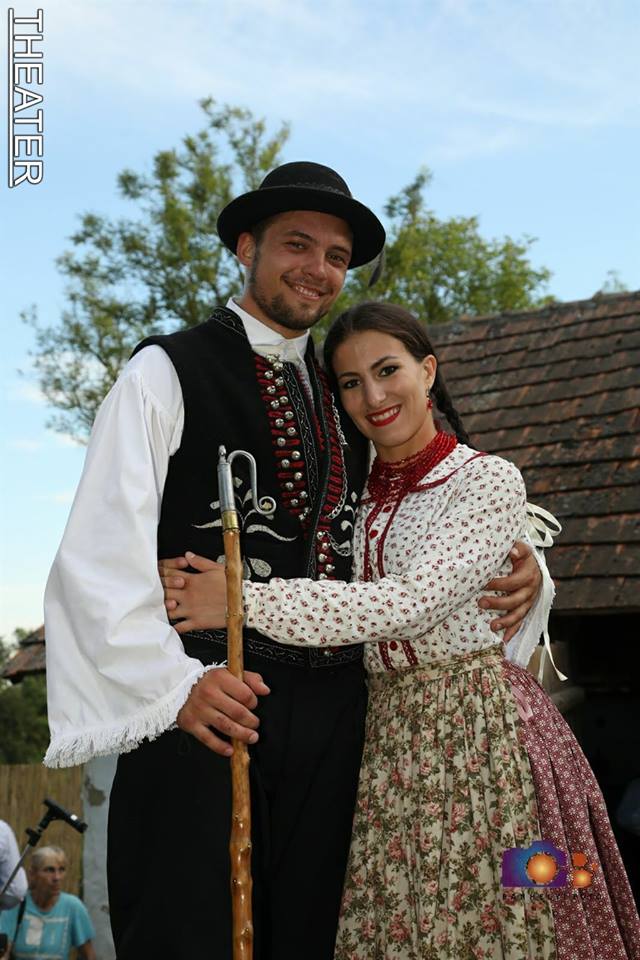
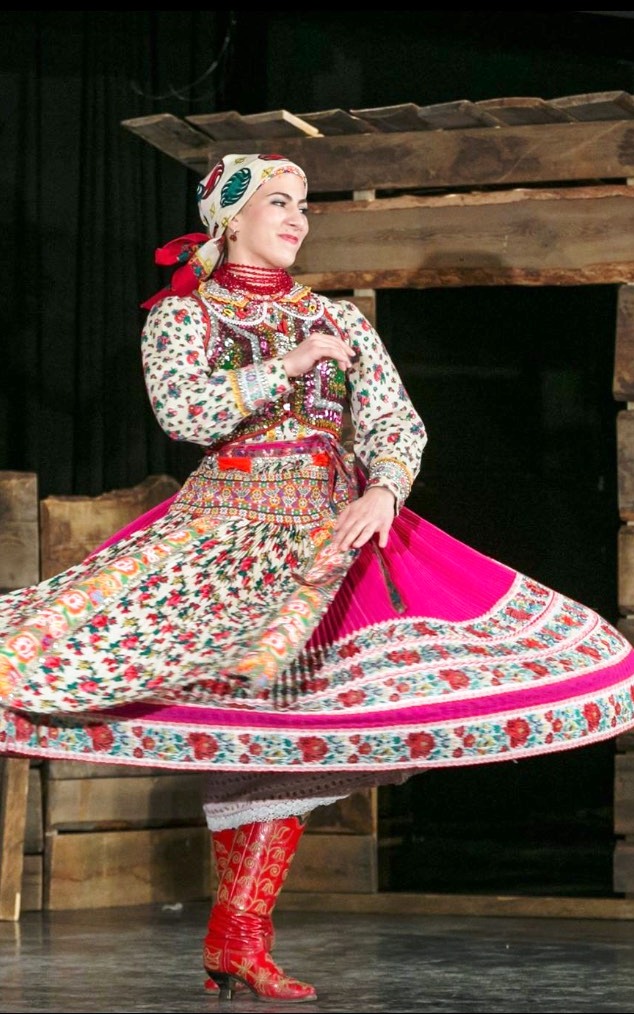
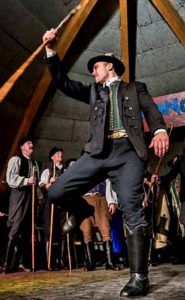
Gábor Norbert Kovács entered this world in Ajka (western Hungary) as the son of folk dancer parents. As a child, he began dancing in the town of his birth, ultimately graduating from the Magyar Táncművészeti Főiskola (Hungarian Dance Academy) in the program for folk dance and theater dance. After his graduation, along with his activity as a dancer he has been involved in teaching folk dance in schools. He is a former dancer of the Magyar Nemzeti Táncegyüttes (Hungarian National Dance Ensemble).
In 2013, he received recognition as a ‘Golden Spur Dancer’ at the Békéscsabai Országos Szólótáncfesztivál (The National Solo Dance Festival in Békéscsaba).
Nóra Kovács-Gál danced in various amateur ensembles from childhood. As a young person, she danced in the Bocskai Néptáncegyüttes (eastern Hungary), as a university student, in the Szentendre Táncegyüttes, then for a year as a professional dancer in the Magyar Nemzeti Táncegyüttes (Hungarian National Dance Ensemble).
She has had an opportunity to work with many Hungarian and foreign folk dance ensembles (London, Melbourne, Erdély, Vajdaság, for example) in which capacity she was awarded recognition for choreography (Martin György Országos Néptáncfesztivál 2015, Kállai Kettős Néptáncfesztivál 2016). In 2017, at the Nemzetközi Párostánc competition (International Couples’ Dance Competition), she was recognized as “Az év páros táncosa” (The Couples’ Dancer of the Year). She was recently awarded the title “Eternal Golden Pearl Dancer”.
Videos of Gábor and Nóra dancing : [One] [Two]
Dance Instructors – Mátyás Tima and Boglárka Brenner
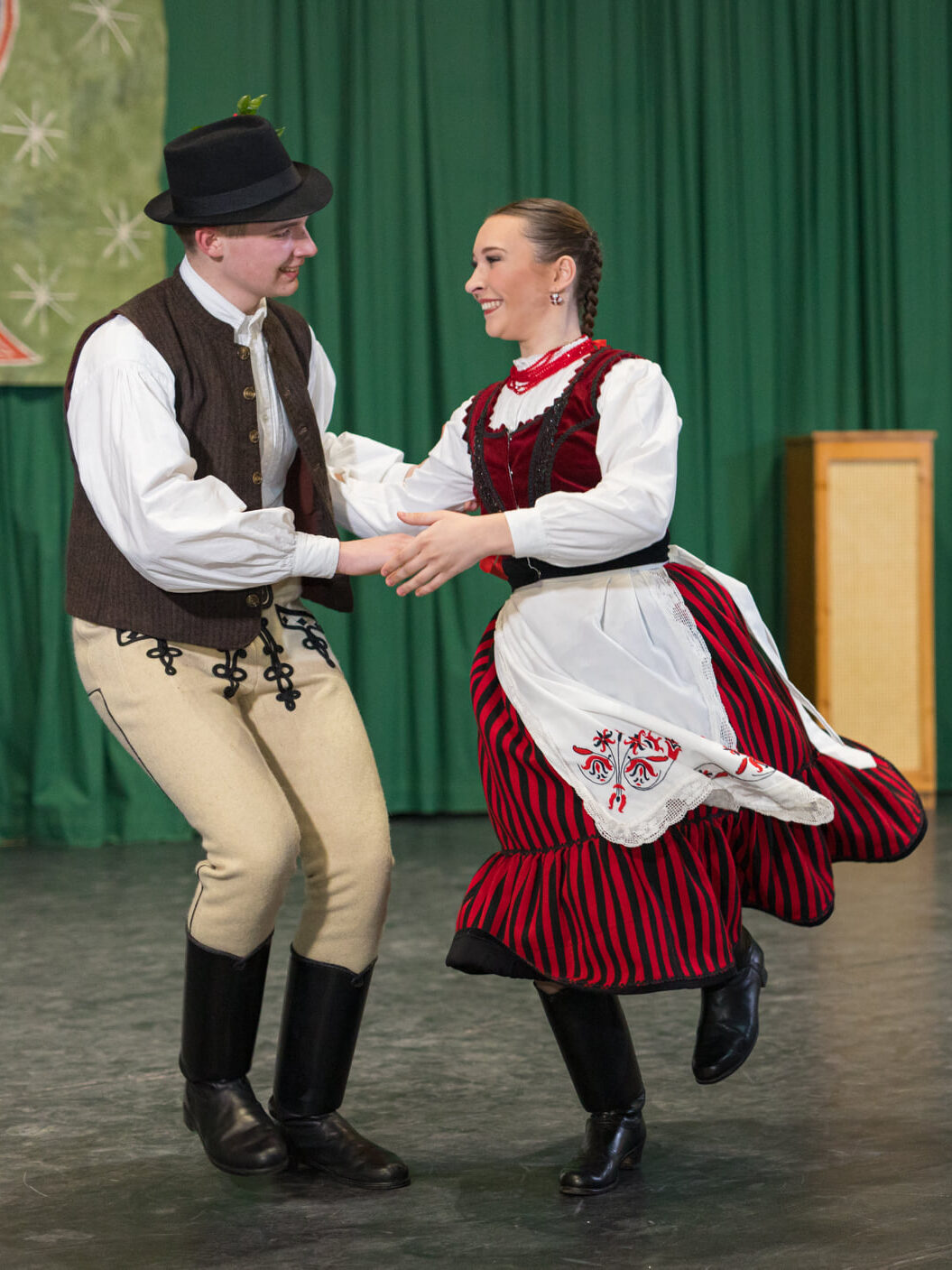
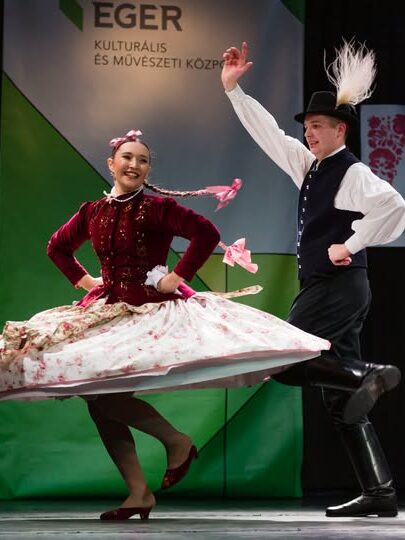
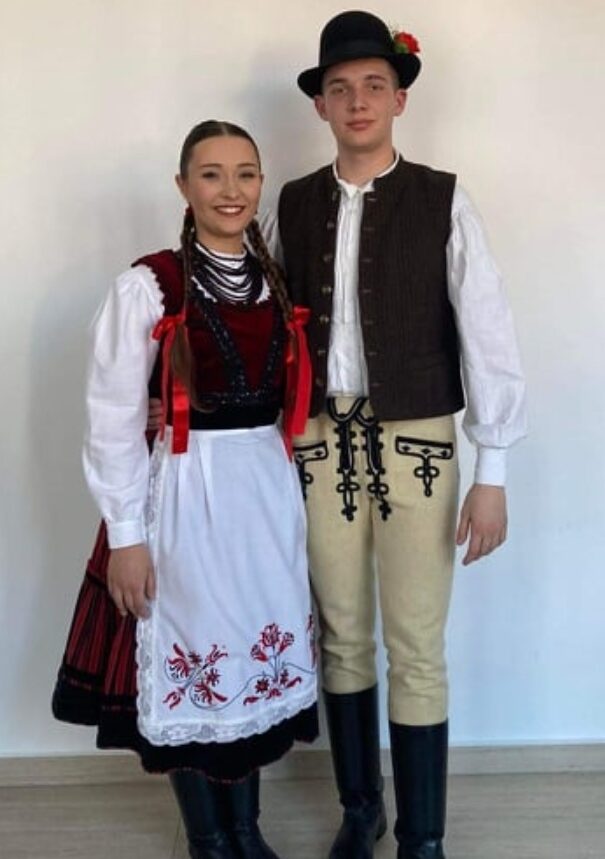
Mátyás Gyula Tima is a 20-year-old passionate folkdance enthusiast. He was captivated by the world of folkdance as a child and since then this journey has become one of the most defining parts of his life. He grew up in a village in a rural family so in addition to folkdance, traditional village life and peasant culture are also close to his heart. He took his first steps in Pápa, and then was able to develop further under the guidance of Norbert “Cimbi” Kovács and Beáta Gaschler, who shaped his dance skills for seven years and gave him the confidence to enter in competitions.
He participated in more and more regional and national solo dance competitions, gaining experience and recognition. His first prize was the Bakony Virága award, and then he won the Mezőföld Virágai award twice. He won the Pajta Solo Dancer Award and twice received the Figure Dancer title at the Sopron National Solo Folk Dance Competition. Most recently, at the 12th National Youth Solo Dance Competition, he was awarded the Ezüstpitykés Dancer Award, which he achieved with Boglárka Brenner (“Bogi”), his current teaching partner.
Mátyás presently dances as a member of the Veszprém-Bakony Dance Ensemble, under the direction of Ignác Kádár and Anett Nagypál, and in recent years he has also been able to learn from such great masters as Gábor Kovács and Nóra Kovács-Gál.
Recently, he has taught at the Forduló Néptáncegyüttes in Gödöllő, the Cserdülő Néptáncegyüttes in Márkó, and last summer, together with Bogi, he taught children at the Vándor Néptánctábor in Kalotaszeg, Nyárszó.
Mátyás currently studies agricultural engineering at the Gödöllő University of Agricultural Sciences, and is enrolled in a secondary dance teacher training course. Mátyás is looking forward to sharing his passion and experiences in dance and Hungarian culture at Ti Ti Tábor with great enthusiasm!
Boglárka Brenner has been dancing since she was 6 years old. She attended the Pápai Református Collegium “Tánc-Lánc” Elementary School of Arts and then danced with the Pápai Vadvirág Art Association. She continued her studies as a folkdance student at the Pápai Református Collegium High School and Art High School in 2018. Since 2023, she has been a student of the Sapientia Transylvanian Hungarian University, majoring in dance, and the University of Debrecen, Faculty of State and Law, majoring in law.
Boglárka has danced with a variety of ensembles including the Győr Lippentő Dance Ensemble (2021-2022), the Youth Dance Group of the Élő Forrás Association for the Preservation of Traditions (2021 to present), the Fitos Dezső Company (2022), and the Szentendre Dance Ensemble (2022). She currently dances in the Mérai Cifra Néptáncejüttes, where she has deepened her knowledge of the dances of Kalotaszeg.
Boglárka has won numerous awards. At the IX. Mezőföld Virágai solo dance competition, she received the recognition of Mezőföld Virágai. In 2022, she made it to the finals of the XII. National Youth Solo Dance Competition, then at the finals she won the Pearl Collar Dancer title (Gyöngygalléros táncos) and received a special award for outstanding female performer. At the end of her high school studies, in April 2022, she received her school’s most prestigious award, the Tarczy Prize, in which her exceptional willpower, persistent diligence, outstanding folkdance results, as well as her recitations, speeches and publications in countless places were recognized. In May 2023, she passed the qualifying exam with honors at the Pápai Vocational High School, graduating with a specialization in folk dance.
In the summer of 2024, she participated as an instructor in the Vándor Néptánctábor in Kalotaszeg. Boglárka is actively involved in the community in Kiscsősz as a volunteer and member of the youth group. In December 2024, she was awarded the Veszprém County Young Volunteer of the Year Award for her volunteer work in the Kiscsősz community.
